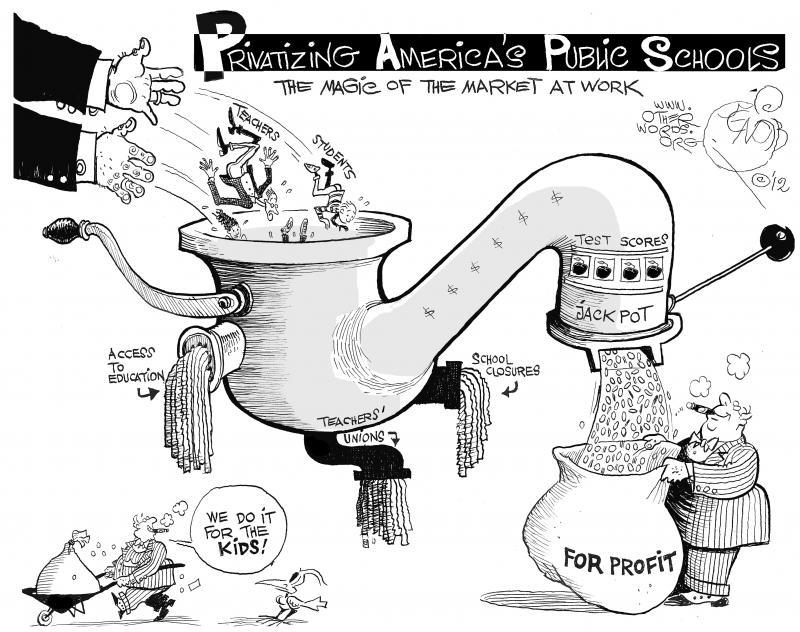If you have a lot of patience, and you probably have more than the common person if you're a teacher, have a go at hearing
some of the Republican candidates' ideas for education.
The 2015 Education Summit in New Hampshire was hosted by Campbell Brown who claims to speak for 74 million children under the age of eighteen, but seems practically incapable of teaching any of them herself, long-term.
In the initial session, Brown notes that she will interview from 9 a.m. straight through to 12:15 p.m., without any break. She adds, "unless I pass out." If interviewing one candidate at a time, from her cozy chair seems a difficult task, can you imagine her standing in front of thirty-four students for most of the day, five days a week, and grading 175 homework assignments each night? Alas, it is much easier to attack teachers and their job protections than to do the job yourself.
As I listened to her conversations, I was struck by a number of things. Not surprisingly, most of the six candidates agreed on a number of points. They wished to devolve education from Washington to the states, localities and parents. They wished to increase "school choice." They identified teachers' unions, whom many of them painstakingly distinguished from the teachers themselves, as their real nemesis. Some said they could work with Randi Weingarten (Christie); others said they could not (Bush). They rejected the Common Core State Standards, several doing an about face from years back.
Jeb Bush criticized the public "monopoly" of education. He related the story of a boy in a public high school who could not figure out that there was an hour and a half between the 1 p.m. start and 2:30 p.m. finish of a ballgame. He mentioned his great teacher at Andover who made him struggle through Cervantes'
Don Quixote in its original Spanish. I wondered if the boy having trouble with the clock at the imaginary baseball game might possibly have been able to read Cervantes better than Bush. Little attention was paid in the debate to the problems faced by English-language learners in our schools. There will be more of them in the future.
Bush, of course, wants "accountability." And, as is the opinion of so many "reformers" of his ilk, accountability can only be achieved by pinning test scores on teachers. To think that a teacher could be brought down any year (after many years of exemplary service) by a society in which children face increasing poverty is nothing more than the "soft bigotry of low expectations." The single driver of a student's success is a "capable teacher." Bush even seemed to blame continuing strife at Ferguson on teachers (44:08). Since I didn't expect much more from Jeb Bush, I suppose, I, too, am guilty of the "soft bigotry of low expectations" for his ed. policies.
Scott Walker described the barriers to successful education. He called out Washington, teachers' unions (drawing the seemingly tenuous distinction made by many candidates between teachers and their unions) and funding. He promoted the idea that many Americans could find good jobs with just and Associate Degree. It would be nice to think so, but since I'm beginning to doubt that I will be able to maintain a good job with my Masters given this current climate of ed. "reform," I'm a little doubtful.
John Kasich asked why kids arrive at college unprepared. I have one answer from NY. I call it ed. "reform." In this new climate of ed. "reform" ushered into NYC under Mayor Bloomberg, kids had to be moved along at any cost or the school might be closed. Graduation numbers had to climb so Bloomberg could tout the title of Education Mayor. The Regents exams became easier for a time. Credit schemes were manufactured. Teachers were pressured.
Kasich further praised mentors, encouraged teachers to tell students to "stay off of drugs" a la Nancy Reagan's "Just-Say-No" campaign and called out to God. Also, as pointed out by
NYC Educator the other day, he mentioned his desire to ban teacher lounges. So, much for attracting the best and the brightest to a profession in which "professionals" are treated as potential criminals and every possibly conspiratorial site must be shut down.
Perdido Street suggested Kasich might also consider shutting down teacher bathrooms for the very same reason.
Jindal discussed the post-Katrina
"miracle" of New Orleans. He was careful not to praise the storm (a la Secretary Duncan) as the best thing since sliced bread. He had some perceptive thoughts on the failure of Common Core given his role as a parent in the system. He praised "highly-effective" teachers as crucial to student success. Does he knows that highly-effective teachers
lose a lot of their effectiveness when transferred to a school with the neediest children? Does he care whether or not these "highly-effective teachers" would suffer burnout at a Renewal School, a premature stroke, transfer or even quit?
Carly Fiorina seemed very well spoken, although I could not agree with all of her points. She raised the specter of the next Secretary of Education being a champion in the charter-school industry. I immediately envisioned Eva and I was sickened to the Core. She praised the TFA, claiming the single factor which drove so many of these idealistic kids from the classroom was older, embittered teachers. I would guess it's burnout given over-sized classes. To her credit, Fiorina seemed to understand that school must not be all about testing.
I loved her point about the importance of art, history, music and philosophy as a means to shape humanity, citizenry and innovation. Brown seemed confused. Instead of following up on the point which seemed like a spark of inspiration for Fiorina, Brown uttered a few more "ums...um" than usual and turned to another topic. Fiorina, however, managed to return to the same point in her concluding remarks. The point made earlier that Fiorina had a grandchild interested in teaching went over Brown's head. Brown had later asked her if she had any grand kids.
Not surprisingly, Christie harped on the deleterious effects of
unions and tenure. He hopes to equip every kid with an i-pad. Whereas Fiorina understood that a teacher is more important than an i-pad, Christie seemed far less convinced.
To end on a positive note, all of the candidates seemed interested in rewarding good teachers--in one way or another. Fiorina seemed to understand that most teachers don't enter the profession for money. They enter it with lofty ambitions to help kids. The other candidates seemed to swear by merit pay and, the other side of the coin which seemed universally popular with all the candidates, eliminating tenure. Whereas so many politicians believe dollar signs must primarily motivate human behavior and that good teachers can only be measured through standardized test scores, the sad fact is some of the most beautiful souls, so many of them belonging to teachers, build their lives around helping others, not money grubbing, and sparking young imaginations, not prepping kids for standardized blah. Let Governor Kasich speak to God about that sometime!































